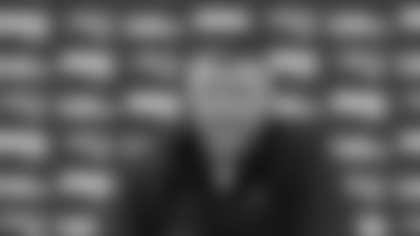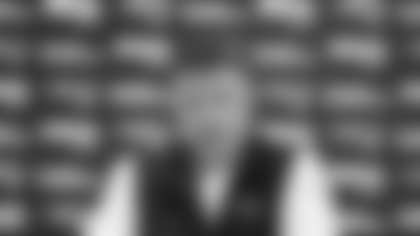HEAD COACH BILL BELICHICK
CONFERENCE CALL
November 7, 2017
[wysifield-embeddedaudio|eid="612641"|type="embeddedaudio"|view_mode="full"]
Q: How would evaluate Phillip Dorsett's transition into the Patriots offense after coming over from the system the Colts ran?
BB: Yeah, Phil's gotten better every week. We've expanded his role and scope, things that he's learning and areas that he's responsible for every week. He's a smart kid. He works hard. He's making progress.
Q: What are some things that he has going for him as a player other than his unique speed?
BB: Well, he's smart. He catches the ball well.
Q: When evaluating this week's matchup do you go back and look more at the Denver game from 2015 that Brock Osweiler started or do you evaluate him more on what he's done recently?
BB: Sure, I mean we'll see most all of it. The most important thing is what he's done in the offense that he's in and the reads and where he's throwing the ball and his progression and so forth in the current offense. But yeah, we have a familiarity with players when we've played against them, how there are certain plays - I'd say maybe not every play - but there are certain plays that stick out that are worth noting because of the player's athletic ability or his experience or, in this case, a throw that he was able to make, that type of thing. There's some relevance there, but look, we're eight games into the regular season here so there's a lot of good tape on Denver to watch including the entire team, but in his role last week.
Q: Are there any stark differences to what they were doing with Trevor Siemian at quarterback versus what they're doing with Osweiler?
BB: Well, I mean the offense is basically the same; yeah.
Q: With a player like Brandon King who's role is primarily on special teams, how much time do you spend throughout the week preparing them on offense or defense in the event they were thrust into a role there?
BB: Right. Those players all have - guys that play a lot in the kicking game also have responsibilities on the offensive or defensive side of the ball. They, like a lot of players, get a majority of their reps in with the scout team, but they're in the meetings and the walkthroughs and they're responsible for their position on their respective side of the ball.
Q: King played a number of different positions in college and then some safety here upon arrival in New England. What eventually made linebacker the best position for him here in the NFL?
BB: Well, again, with players like that a lot of times their role starts situationally first as opposed to playing on all three downs. I'd say that's probably the way it is with most players like that. Brandon has good size, and he can run, and he's athletic, plays well on his feet and has good speed, but yeah, somewhere between those positions. He played defensive line in college. I think in this league it's a little more of a safety-to-linebacker, somewhere in that range he would fit.
Q: How big of a challenge is this Broncos secondary with Aqib Talib and Chris Harris Jr.?
BB: Yeah, and [Bradley] Roby. Roby plays two-thirds of the plays, so those guys are very good. They're good enough that a lot of times against three receivers they leave their base defense in there and play three corners and just keep their base front in the game. Those guys are all good. They're very experienced. They play well together. They tackle well as a group. They're physical. It's a very good corner group and a lot of depth at that position.
Q: What separates Von Miller from other edge rushers around the NFL?
BB: Well, I think Von's got a combination of a lot of skills that make him a pretty special player. He's got speed, power, he's athletic and quick, so he can win with quickness on inside moves, counter moves. He anticipates well. He's a smart player. He makes some plays instinctively or with some anticipation so that he can get a half a step and jump on a play. He gets off the ball very quickly and he's a hard guy to - it's hard to beat him to the punch. Usually, it seems like he wins on the initial strike against the tight end or tackle a lot of the times. He plays with good pad level.
Q: Is their running game more about their personnel and the skills they have or is it more about the scheme and the commitment to running the ball?
BB: Well, scheme-wise this year's running game is a little bit different than what they did in the past under Coach [Gary] Kubiak. They have a lot of scheme runs, a lot of different ways to attack the defense with the running game, multiple blocking schemes and formations, ways to get there. Their backs are good. [Jamaal] Charles and [C.J.] Anderson, I'd say, are different in terms of their running style. They're both effective. They're just a little bit different. They do a good job. They have a lot of, as I said, a lot of different ways to attack in the running game. I think the receivers do a very good job of blocking. [Emannuel] Sanders and [Demaryius] Thomas do a good job of going in there and digging out safeties and secondary players. It's a strong commitment to the running game all the way across the board and they do a good job of it. They have a good play-action game that ties with it. Coach [Mike] McCoy's a very experienced coach, a good coach, really knows how to attack a defense and knows how to run complementary plays so that if you're stopping one type of play he has something else that he can throw at you that it's hard to stop that and the other play that goes with it. He does a good job with that.
Q: There is always a lot of talk about their zone running scheme. Are they different this year in that regard?
BB: Yeah, I'd say with Coach Kubiak they were very heavy on the zone scheme. I won't say exclusively, but it was pretty heavy on the zone scheme. With Coach McCoy there's some zone and some of it is a different type of zone. They run out of the shogun, but there's a lot more scheme plays; double teams, pullers, gap-type blocking. They make you defend everything and that's tough. As I said, when you throw the play-action passes in there with it, it's quite a bit to deal with.
Q: How realistic is it in your mind that the team can continue to have the same number of penalties and have it not catch up to them in terms of wins and losses?
BB: Yeah, I mean I don't know the answer to that question.
Q: What are your thoughts on the penalties in recent weeks?
BB: We always look to play penalty-free. That's our goal every week.
Q: How do you feel the team has done in that area the last few weeks?
BB: Well, again, that's our goal every week, so each week we'll try to hit that and just readdress it every week. It's different plays, it's a different defense, there's different situations, but yeah, we want to avoid as many of those plays as we can.
Q: David Andrews seems to be a little undersized for your average center. What has he done throughout his career that allows him to be successful at that position and how often do you see that?
BB: Well, I think there are a number of centers in the league that are around his size. That position is kind of a unique positon on the offensive line. It's a little bit different than the other four because of the snapping and the communication, identification of the fronts and adjustments. When you play center you're right in the middle of every play. There's no play that doesn't involve the center or his block, so a lot of it has to do with blocking angles and how to get the most favorable position of our five guys against their five guys, the five guys that we're responsible for blocking with that group. A lot of times it's the center's job to either make a call or coordinate it or sometimes it's the actual blocking execution and the technique that it's important to get that handled properly. David's good at all of those things. He has a lot of experience in his life playing center. I think a lot of those things come pretty naturally to him, the understanding of how far you have to go, how quickly you have to get there, how close in proximity is your teammate, where is the play designed to run and so forth. He's pretty good at all of those things. He has a good instinct for the position.
Q: Have Mike McCoy's offense's adapted over the years to fit his different quarterback's skills with his different tenures in Denver with Tim Tebow, or Peyton Manning or with Philip Rivers in San Diego?
BB: Sure. But I think most all coordinators have had to do that one way or another either with the quarterback or some other aspect of the offense. If you have a power back versus a speed back or a blocking tight end versus receiving tight end, whatever it is. All players are different. All skills are different. But if you have a player that's a highly productive player and he has a particular skill set then you want to find a way to utilize that. Maybe not necessarily change your whole offense and build it around it - I'm not saying that - but be able to utilize it. I think that's fairly common with all coordinators; offense or defense. You run into that and you go to a different team or you go with different players and you maybe have something that's different than what you had at a previous team, both good and bad. Maybe a guy that did something for you at another team you can't replicate, and maybe you have another guy on the new team that has skills that are a little bit different than what you had in the past and you find ways to utilize them. He does a good job of that; no doubt about it.
Q: Longtime NFL coach Red Miller passed away this year. From your time in Denver was there anything that defined Red Miller as a coach and what kind of a legacy does he leave behind?
BB: Red was an offensive line coach in his career and then when he went and was the head coach at Denver he worked primarily with the offense and the offensive line. He continued to work with that group, so I was more on the defensive side of the ball, or I was totally on the defensive side of the ball and some special teams with Coach [Joe] Collier and Richie McCabe. So, I didn't really have a lot of interaction with Red because I was just on the other side of the ball. He was a strong personality that had a good way with his players, a good way of motivating his players by getting on them, but again, he was pretty heavily involved with the offense and Joe really ran the defense and handled most things on the defensive side of the ball. Even though I was on the staff there - I'm not saying I didn't have interaction with Red - but the way that was set up was the offensive coaches had a lot more interaction with him than the defensive coaches or players for that matter.








































